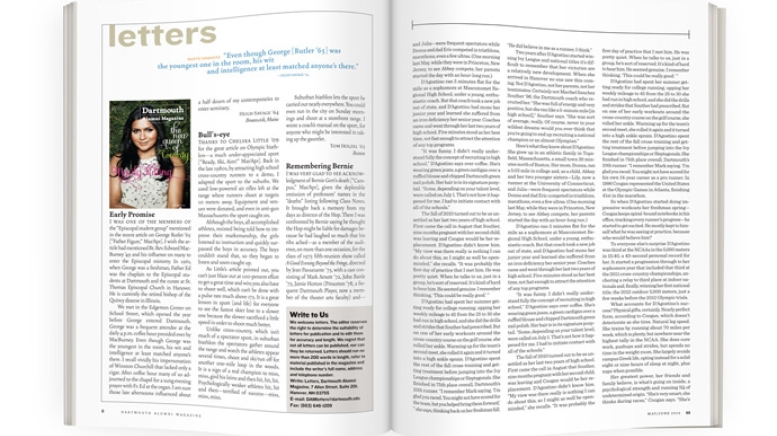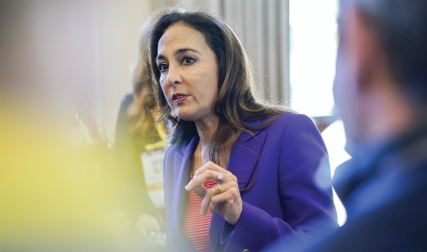Early Promise I was one of the members of the “Episcopal student group” mentioned in the recent article on George Rutler ’65 [“Father Figure,” Mar/Apr]. I wish the article had mentioned Rt. Rev. Edward MacBurney ’49 and his influence on many to enter the Episcopal ministry. In 1961, when George was a freshman, Father Ed was the chaplain to the Episcopal students at Dartmouth and the curate at St. Thomas Episcopal Church in Hanover. He is currently the retired bishop of the Quincy diocese in Illinois. We met in the Edgerton Center on School Street, which opened the year before George entered Dartmouth. George was a frequent attendee at the daily 4 p.m. coffee hour presided over by MacBurney. Even though George was the youngest in the room, his wit and intelligence at least matched anyone’s there. I recall vividly his impersonation of Winston Churchill that lacked only a cigar. After coffee hour many of us adjourned to the chapel for a sung evening prayer with Fr. Ed at the organ. I am sure those late afternoons influenced about a half dozen of my contemporaries to enter seminary.
Hugh Savage ’64 Brunswick, Maine
Bull’s-eye Thanks to Chelsea Little ’09 for the great article on Olympic biathlon—a much under-appreciated sport [“Ready, Ski, Aim!” Mar/Apr]. Back in the late 1980s, by attracting high school cross-country runners to a demo, I adapted the sport to the suburbs. We used low-powered air rifles left at the range where runners shoot at targets 10 meters away. Equipment and venues were donated, and even in anti-gun Massachusetts the sport caught on. Although the boys, all accomplished athletes, resisted being told how to improve their marksmanship, the girls listened to instruction and quickly surpassed the boys in accuracy. The boys couldn’t stand that, so they began to listen and soon caught up. As Little’s article pointed out, you can’t just blaze out at 100-percent effort to get a great time and win; you also have to shoot well, which can’t be done with a pulse rate much above 175. It is a great lesson in sport (and life) for everyone to see the fastest skier lose to a slower one because the slower sacrificed a little speed in order to shoot much better. Unlike cross-country, which isn’t much of a spectator sport, in suburban biathlon the spectators gather around the range and watch the athletes appear several times, shoot and ski/run off for another one-mile loop in the woods. It is a sign of a real champion to miss, miss, gird his loins and then hit, hit, hit. Psychologically weaker athletes hit, hit and then—terrified of success—miss, miss, miss. Suburban biathlon lets the sport be carried out nearly everywhere. You could even run in the city on Sunday mornings and shoot at a storefront range. I wrote a coach’s manual on the sport, for anyone who might be interested in taking up the gauntlet.
Tom Holzel ’63 Boston
Remembering Bernie I was very glad to see acknowledgment of Bernie Gert’s death [“Campus,” Mar/Apr], given the deplorable omission of professors’ names in the “deaths” listing following Class Notes. It brought back a memory from my days as director of the Hop. There I was confronted by Bernie saying he thought the Hop might be liable for damages because he had laughed so much that his ribs ached—as a member of the audience, on more than one occasion, for the class of 1975 fifth-reunion show called A Good Evening Beyond the Fringe, directed by Jean Passanante ’75, with a cast consisting of Mark Arnott ’72, John Battle ’75, Jamie Horton (Princeton ’78, a frequent Dartmouth Player, now a member of the theater arts faculty) and—replacing Peter Syvertsen ’75, who had suddenly been offered a summer gig at Actors Equity rates—yours truly. Unless I am much mistaken, that show, revived twice, holds the longevity record for a home-grown theater production at the College, with 31 performances.
Peter Smith ’35A Buffalo, New York
Zero Tolerance I strongly endorse the views in the letter of Richard Hetke ’73 [“Letters,” Mar/Apr] advocating closing or strictly controlling fraternities to curb drinking at Dartmouth. This has been a problem, in one way or another, for more than 50 years. To have another study committee, as President Kim is doing now, is to avoid confronting the problem.
Theodore S. Tapper ’61, DMS’62 Lower Merion, Pennsylvania
A Cloud Zipper I really enjoyed the potpourri of adventures by recent alums roaming around the girdled earth [“Time Out,” Jan/Feb]. Fifty-nine years ago there weren’t too many opportunities to absorb culture and humanity at university-sponsored sites. As a struggling polyglot lo these many years living and working abroad, I am envious of the exposure to living language that Professor Rassias has used to bring so many initially unilingual students into the multilingual globality of the 21st century. (My wife and I are hoping to take the College-hosted Greece and Turkey cruise with Rassias in October and become immersed in the master’s linguistic aura!) If I had known someone was to write the “Time Out” roundup I would have submitted my photo of zip-lining in Costa Rica a few years back when I got the fright of my life zipping above cloud cover before repelling down a 100-foot eucalyptus.
Ed Parsons ’53 Naples, Florida
Trifecta The Nov/Dec 2011 issue was particularly arresting. The roundtable [“How Safe Are We?”] was persuading, the story of Steve Posniak ’65 [“Burned”] was moving, and the account of athletic director Harry Sheehy was informative as to Dartmouth’s athletic plight and its current director.
Quentin Kopp ’49 San Francisco
More Vocals, Please I was hoping to see a detailed article on the Dartmouth Aires, especially since they placed second in NBC’s The Sing-Off, where they were fabulous. Your short piece in your Nov/Dec issue [“Campus”] does not give them full recognition. At the Smith College Silver Chord Bowl in early February the Aires performed extremely well and were wonderful ambassadors for the College. They mingled with alumni and their families before the concert and after it enthusiastically signed autographs, supported other groups and represented Dartmouth superbly.
Philip Stoddard ’58 Hampden, Massachusetts




